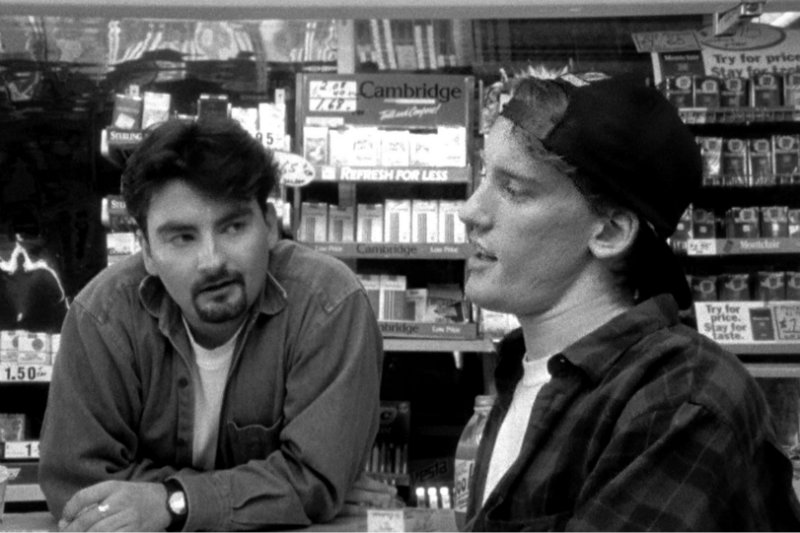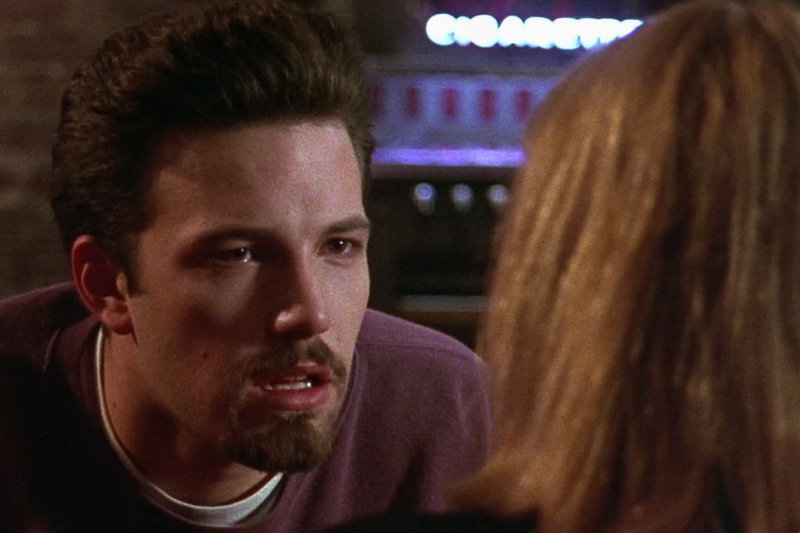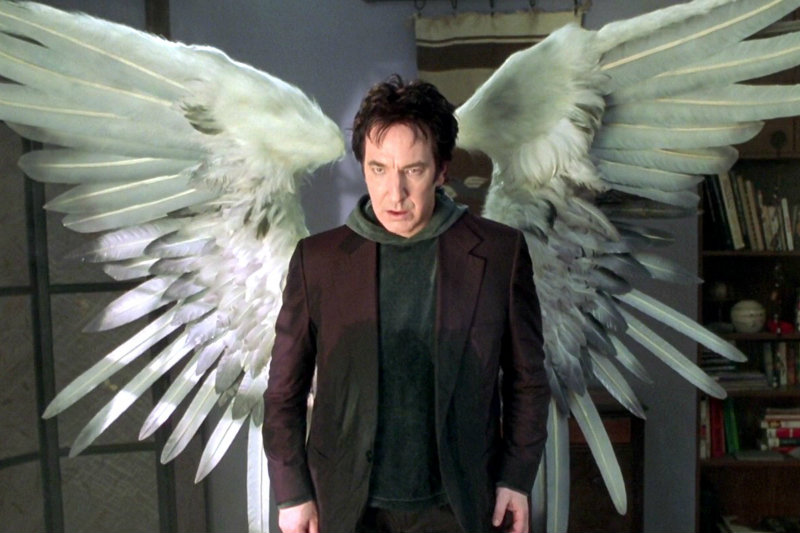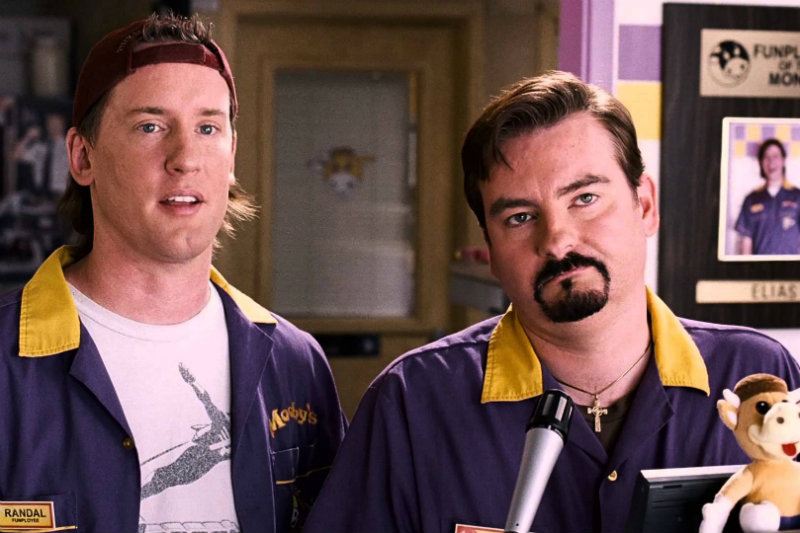Tusk may not have lit the box office on fire since hitting U.S. theaters last month, but if there’s one thing the entertainment world knows, it’s that writer/director Kevin Smith may be down, but he’s never out. Over the past 20 years, Smith has delivered has shaped his career with one daring film after another, including a recent turn towards the macabre. With recent news that his long-awaited sequel Clerks III is finally set to begin filming next June (and the Table’s blatant appreciation of Smith himself already clear), let’s take a look back at the man’s five most unforgettable films:
Clerks (1994)
The one that started it all. Made for just $27,000 and starring a cast of unknowns, Clerks
emerged as an indie darling upon hitting the festival circuit in 1994. Plotwise, the story of Dante (Brian O’Halloran) and Randal (Jeff Anderson) is pretty thin, as Clerks simply chronicles a day in the life of these two blue-collar workers. However, Smith’s sharp writing and incisive wit are the true stars here. Clerks laid the groundwork for what would become Smith’s signature style of pop culture commentary, and it introduced both the inter-woven collection of films known as the View Askewniverse and Smith’s most well-known creations, stoner duo Jay (Jason Mewes) and Silent Bob (Smith).
Chasing Amy (1997)
Smith’s third film demonstrated an impressive leap in maturity, as it tackles a number of deeper themes along with the requisite comedic beats. Ben Affleck – who had a supporting role in Mallrats, Smith’s previous effort – and Joey Lauren Adams star as the film’s central romantic couple, and Jason Lee delivers a winning supporting performance as Affleck’s best friend. Critically acclaimed and well-crafted, Chasing Amy
also establishes the Bluntman and Chronic comic book that would play a more integral role in later Smith films. Moreover, it’s perhaps one of Smith’s most earnest films, featuring some poignant sentiments on sex, love and the nature of relationships.
Dogma (1999)
With his next film, Smith moved from matters of the heart to the word of God. Dogma
Dogma tells the story of an abortion clinic worker (Linda Fiorentino) who discovers that she has been chosen to prevent a pair of fallen angels (Affleck, Matt Damon) from ending existence. The film features a stellar supporting cast – including Lee, Alan Rickman, Chris Rock and Salma Hayek – and Smith continues to show his growing skills as a storyteller. Dogma is part satire, part comedic romp, part fantasy adventure and classic Smith. It also gives Jay and Silent Bob perhaps their largest role yet and sets the stage for the wonderfully outrageous Jay & Silent Bob Strike Back. Although Dogma marked the first time Smith took religion head-on, it wouldn’t be the last.
Clerks II (2006)
Following the unfairly maligned Jersey Girl, Smith retreated back to the well of his debut film, reuniting the cast of Clerks for a sequel that checks in on Dante and Randal a decade after audiences first met them. The resulting film serves as a meditation on what happens when carefree twenty-somethings evolve into dissatisfied thirty-somethings. Both Smith’s leading men are at the top of their game, and Rosario Dawson and Trevor Fehrman effortlessly mesh with the existing Clerks world. Its humor may be too offensive for some viewers, but Clerks II
is truly a story about friendship, self-identity and growing up. Not too shabby for a film that features one of the most infamous comedic sequences in recent memory.
Red State (2011)
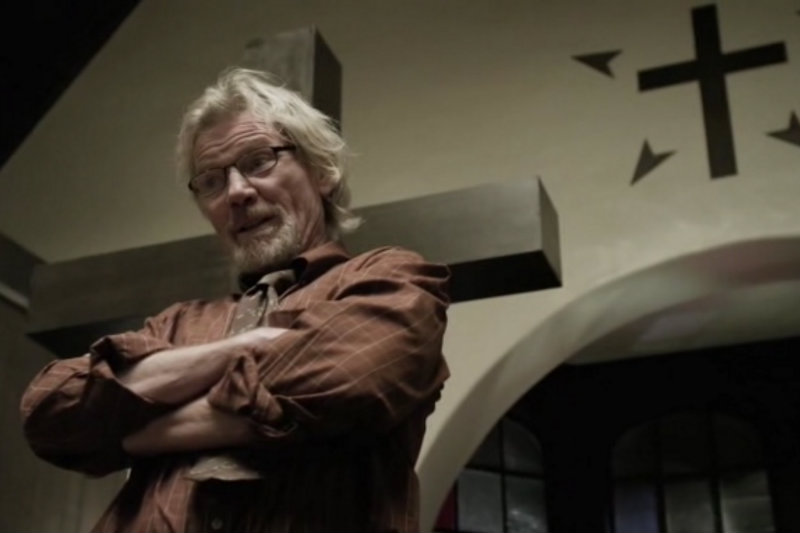 Clerks II ended up being a short-lived return to form for Smith, as he followed it with the underrated box office disappointment Zack and Miri Make a Porno
Clerks II ended up being a short-lived return to form for Smith, as he followed it with the underrated box office disappointment Zack and Miri Make a Porno. Meanwhile, Cop Out – the first film Smith directed but didn’t write – took the gifted filmmaker as far from his muse (not Mewes, mind you) as he’d ever been. Who could have guessed then that he would emerge stronger than ever with a controversial horror film about a group of religious fundamentalists and their fire-and-brimstone leader (played to perfection by Tusk‘s Michael Parks)? Smith distributed the project, envisioning it as the game-changing finale of his career (which it thankfully wasn’t). Taut, unpredictable and fuelled by the same devil-may-care attitude that brought Smith fame in the first place, Red State ended up becoming the preface to an entirely fresh chapter of his filmmaking career, one that now continues with Tusk and a slew of other in-development projects.
Did we miss your favorite Kevin Smith film? Sound off in the comments with your thoughts, or reach out to Rob directly on Twitter @crookedtable.


